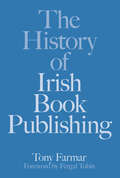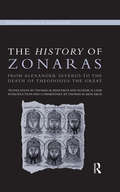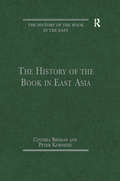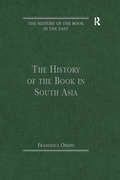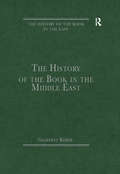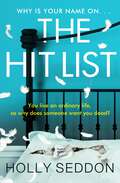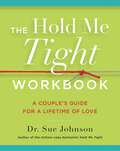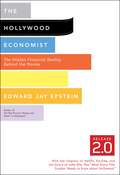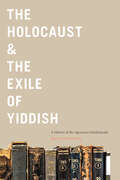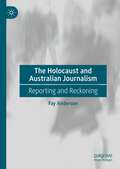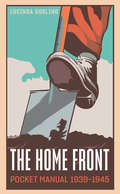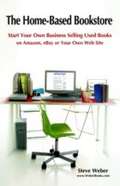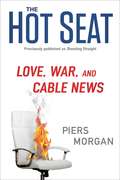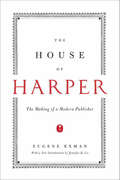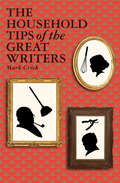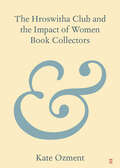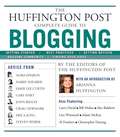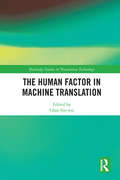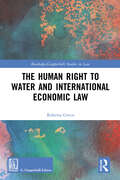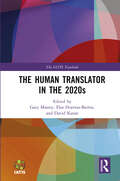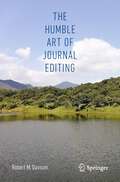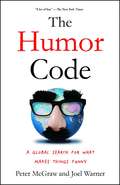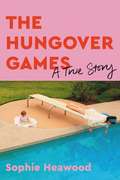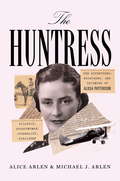- Table View
- List View
The History of Irish Book Publishing
by Conor Kostick Tony FarmarThe story of how books in all their variety, from mathematics textbooks to murder mysteries, reach the hands of readers is a significant one. This is especially so in Ireland, where Irish publishing houses battle to flourish and survive through economic crises and in a market dominated by British publishers. The paradox of publishing, writes Tony Farmar, is that though it is a business, and a risky business everywhere, it is much more than that. Publishers’ ‘gatekeeping, encouragement and investing’ help to shape what has been called a country’s ‘mentalities’. Thus the importance of a flourishing local publishing industry, especially those that share a language with an ‘over-mighty neighbour’. The product of many years of research, this book focuses on the years from 1890 and includes a detailed chronicle of the key dates and events in the development of Irish book publishing. The final chapter, by Conor Kostick, covers the period from 2008 to 2018. What emerges is a vivid portrait of how the Irish book publishing industry contributed and continues to contribute in immeasurable ways to the intellectual and cultural life of Ireland.
The History of Zonaras: From Alexander Severus to the Death of Theodosius the Great
by Thomas Banchich Eugene LaneWhile an exile from Constantinople, the twelfth-century Byzantine functionary and canonist John Zonaras culled earlier chronicles and histories to compose an account of events from creation to the reign of Alexius Comnenus. For topics where his sources are lost or appear elsewhere in more truncated form, his testimony and the identification of the texts on which he depends are of critical importance. For his account of the first two centuries of the Principate, Zonaras employed now-lost portions of Cassius Dio. From the point where Dio’s History ended, to the reign of Theodosius the Great (d. 395), he turned to other sources to produce a uniquely full historical narrative of the critical years 235-395, making Books XII.15-XIII.19 of the Epitome central to the study of both late Roman history and late Roman and Byzantine historiography. This key section of the Epitome, together with Zonaras’ Prologue, here appears in English for the first time, both complemented by a historical and historiographical commentary. A special feature of the latter is a first-ever English translation of a broad range of sources which illuminate Zonaras’ account and the historiographical traditions it reflects. Among the authors whose newly translated works occupy a prominent place in the commentary are George Cedrenus, George the Monk, John of Antioch, Peter the Patrician, Symeon Magister, and Theodore Scutariotes. Specialized indices facilitate the use of the translations and commentary alike. The result is an invaluable guide and stimulus to further research for scholars and students of the history and historiography of Rome and Byzantium.
The History of the Book in East Asia (The History of the Book in the East)
by Cynthia BrokawThe history of the book in East Asia is closely linked to problems of language and script, problems which have also had a profound impact on the technology of printing and on the social and intellectual impact of print in this area. This volume contains key readings on the history of printed books and manuscripts in China, Korea and Japan and includes an introduction which provides an overview of the history of the book in East Asia and sets the readings in their context.
The History of the Book in South Asia (The History of the Book in the East)
by Francesca OrsiniThe History of the Book in South Asia covers not only the various modern states that make up South Asia today but also a multitude of languages and scripts. For centuries it was manuscripts that dominated book production and circulation, and printing technology only began to make an impact in the late eighteenth century. Print flourished in the colonial period and in particular lithographic printing proved particularly popular in South Asia both because it was economical and because it enabled multi-script printing. There are now vibrant publishing cultures in the nation states of South Asia, and the essays in this volume cover the whole range from palm-leaf manuscripts to contemporary print culture.
The History of the Book in the Middle East (The History of the Book in the East)
by Geoffrey RoperThis selection of papers by scholarly specialists offers an introduction to the history of the book and book culture in West Asia and North Africa from antiquity to the 20th century. The flourishing and long-lived manuscript tradition is discussed in its various aspects - social and economic as well as technical and aesthetic. The very early but abortive introduction of printing - long before Gutenberg - and the eventual, belated acceptance of the printed book and the development of print culture are explored in further groups of papers. Cultural, aesthetic, technological, religious, social, political and economic factors are all considered throughout the volume. Although the articles reflect the predominance in the area of Muslim books - Arabic, Persian and Turkish - the Hebrew, Syriac and Armenian contributions are also discussed. The editor’s introduction provides a survey of the field from the origins of writing to the modern literary and intellectual revivals.
The Hit List: 'Sinister, clever and utterly compelling' Lesley Kara
by Holly SeddonWhat would you do if you found your own name on a hit list? Seddon addresses this terrifying question in an explosive novel. One of the most exciting, brave and clever books I have ever read. The Hit List is my book of the year. Gillian McAllister, author of How to DisappearThis novel kept me guessing to the end. A twisty, intelligent thrill ride. Excellent! Will Dean, author of Black River This meticulously plotted novel will suck you ever deeper into its dark underbelly. Sinister, clever and utterly compelling. Lesley Kara, author of WHO DID YOU TELL?On the anniversary of her husband's accidental death, Marianne seeks comfort in everything Greg left behind. She wears his shirt and cologne, reads their love letters and emails. Soon she's following his footsteps across the web, but her desperation to cling to any trace of him leads her to the dark web. And a hit list with her name on it. To try to save herself from Sam, the assassin hired to kill her, Marianne must first unpick the wicked web in which Greg became tangled. Was Greg trying to protect her or did he want her dead?A gripping and emotional ebook bestseller about a woman who discovers a shocking secret about her late husband that will hook you from the first pageLoved THE HIT LIST? You can download Holly Seddon's latest twisty thriller THE SHORT STRAW now, an atmospheric mystery about three sisters stranded in an abandoned manor house later at night.
The Hit List: 'Sinister, clever and utterly compelling' Lesley Kara
by Holly SeddonWhat would you do if you found your own name on a hit list? Seddon addresses this terrifying question in an explosive novel. One of the most exciting, brave and clever books I have ever read. The Hit List is my book of the year. Gillian McAllister, author of How to DisappearThis novel kept me guessing to the end. A twisty, intelligent thrill ride. Excellent! Will Dean, author of Black River This meticulously plotted novel will suck you ever deeper into its dark underbelly. Sinister, clever and utterly compelling. Lesley Kara, author of WHO DID YOU TELL?On the anniversary of her husband's accidental death, Marianne seeks comfort in everything Greg left behind. She wears his shirt and cologne, reads their love letters and emails. Soon she's following his footsteps across the web, but her desperation to cling to any trace of him leads her to the dark web. And a hit list with her name on it. To try to save herself from Sam, the assassin hired to kill her, Marianne must first unpick the wicked web in which Greg became tangled. Was Greg trying to protect her or did he want her dead?A gripping and emotional ebook bestseller about a woman who discovers a shocking secret about her late husband that will hook you from the first pageLoved THE HIT LIST? You can download Holly Seddon's latest twisty thriller THE SHORT STRAW now, an atmospheric mystery about three sisters stranded in an abandoned manor house later at night.
The Hold Me Tight Workbook: A Couple's Guide for a Lifetime of Love (The Dr. Sue Johnson Collection #4)
by Dr. Sue JohnsonA companion workbook to Dr. Sue Johnson&’s million-copy bestseller Hold Me Tight, packed with exercises, conversation prompts, and activities to help couples strengthen their bond, deepen their intimacy, and cultivate a lifetime of love. Dr. Sue Johnson's landmark book Hold Me Tight has helped more than 1 million readers strengthen and repair their romantic relationships. Now, finally, comes a companion workbook designed to help couples open up, reestablish safe emotional connection, and renew their bond. Drawing on the latest developments in Emotionally Focused Therapy, a field pioneered by Dr. Johnson, The Hold Me Tight Workbook is packed with sage wisdom and science-backed advice, as well as compelling conversation prompts, exercises, activities, and resources to help couples work through conflict and achieve greater levels of intimacy. Whether you're celebrating your 50th anniversary or your first, The Hold Me Tight Workbook is an invaluable guide to cultivating a deeper connection — and more fulfilling relationship — with the person you love most.
The Hollywood Economist 2.0: The Hidden Financial Reality Behind the Movies
by Edward Jay EpsteinA fully revised edition of the popular guide to Hollywood finances, updated to reflect even newer films and trendsIn a Freakonomics-meets-Hollywood saga, veteran investigative reporter Edward Jay Epstein goes undercover to explore Hollywood's "invisible money machine," probing the dazzlingly complicated finances behind the hits and flops, while he answers a surprisingly difficult question: How do the studiosmake their money?We also learn:+ How and why the studios harvest silver from old film prints ...+ Why stars do--or don't do--their own stunts ...+ The future of Netflix: Why the "next big thing" now seems in such deep trouble...+ What it costs to insure Nicole Kidman's right knee...+ How Hollywood manipulates Wall Street: including the story of the acquisition of MGM... wherein a consortium of banks and hedge funds lost some $5 billion... while Hollywood made millions.+ Why Arnold Schwarzenegger is considered a contract genius...+ The fate of serious fare: How HBO, AMC, and Showtime have found ways to make money offer adult drama, while the Hollywood studios prefer to cater to teen audiences.+ Why Lara Croft: Tomb Raider is considered a "masterpiece" of financing ... From the Trade Paperback edition.
The Holocaust & the Exile of Yiddish: A History of the Algemeyne Entsiklopedye
by Barry TrachtenbergIn the early 1930s in Berlin, Germany, a group of leading Eastern European Jewish intellectuals embarked upon a project to transform the lives of millions of Yiddish-speaking Jews around the world. Their goal was to publish a popular and comprehensive Yiddish language encyclopedia of general knowledge that would serve as a bridge to the modern world and as a guide to help its readers navigate their way within it. However, soon after the Algemeyne entsiklopedye (General Encyclopedia) was announced, Hitler’s rise to power forced its editors to flee to Paris. The scope and mission of the project repeatedly changed before its final volumes were published in New York City in 1966. The Holocaust & the Exile of Yiddish untangles the complicated saga of the Algemeyne entsiklopedye and its editors. The editors continued to publish volumes and revise the encyclopedia’s mission while their primary audience, Eastern European Jews, faced persecution and genocide under Nazi rule, and the challenge of reestablishing themselves in the first decades after World War II. Historian Barry Trachtenberg reveals how, over the course of the middle decades of the twentieth century, the project sparked tremendous controversy in Jewish cultural and political circles, which debated what the purpose of a Yiddish encyclopedia should be, as well as what knowledge and perspectives it should contain. Nevertheless, this is not only a story about destruction and trauma, but also one of tenacity and continuity, as the encyclopedia’s compilers strove to preserve the heritage of Yiddish culture, to document its near-total extermination in the Holocaust, and to chart its path into the future.
The Holocaust and Australian Journalism: Reporting and Reckoning
by Fay AndersonThis book explores the Australian press reporting of the persecution and genocide of European Jews, and the extent to which the news of the Holocaust was known and believed, revealed and hidden, and acknowledged and minimised. Spanning the coverage of Hitler’s political ascent in the 1920s through to the Nazis’ extermination campaign, it culminates in the accounts of the trials of Nazi war criminals and the post-war transnational migration to Australia of Holocaust survivors, to a country far from universally welcoming in its reception of them. The book also tells the story of the journalists who reported on these tragic events and the editors who published them, along with the political, social and cultural context in which they worked, in an environment influenced by exclusionary ideas about race and nationality that did not necessarily inspire sympathy for Jews and their trauma. This book sheds light on the ethics of reporting human suffering, violence and genocide and – centrally – on the role of the press in shaping Australia’s collective memory of the Holocaust. It encourages readers to think critically about media power, public apathy, advocacy, and the importance of truth. Disturbing evidence of increasing anti-Semitism in Australia as elsewhere, along with continuing Holocaust denial, provide an additional urgency to this study.
The Home Front Pocket Manual, 1939–1945 (The\pocket Manual Ser.)
by Lucinda GoslingThis compilation of WWII-era magazine articles is &“a really useful reference guide covering aspects of life in the 1940s . . . packed with information&” (Home Front History). This manual brings together articles from stylish contemporary magazines of Britain during the World War II era, including Britannia & Eve, the Illustrated Sporting and Dramatic News, and Tatler, on all aspects of life on the home front. These fascinating articles cover complying with black-out regulations; what to do with the family car; augmenting rationed foods and turning them into tasty meals; contributing to the war effort by keeping livestock, salvaging valuable materials, and growing food—all, of course, while remaining fashionable and keeping up appearances.
The Home-based Bookstore: Start Your Own Business Selling Used Books on Amazon, Ebay or Your Own Web Site
by Steve WeberShows you how to open a used bookstore and sell on amazon.com, ebay.com, or other sites, with a concentration on amazon.com. Discusses where to find books, good business practices, and tools that can help you with your book business.
The Hot Seat: Love, War, and Cable News
by Piers MorganFrom ultimate media insider Piers Morgan, an adrenaline-fueled account of life at CNN, exclusive stories about his celebrity encounters, and details about his high-profile decision to take on the issue of gun control at its historical tipping point.When Piers Morgan arrived in the US, he was a thoughtful outsider and observer of our country--a modern-day Alexis de Tocqueville, if a limousine-chasing British tabloid editor could be called that. From rushing to the roof of the studio that filmed America's Got Talent so that he could broadcast live breaking news about the tsunami in Japan, only to rush back and judge a singing, dancing Christmas tree; from being snubbed by Bill O'Reilly, who pretended not to recognize him (despite the largest cable news marketing campaign in television history) to, moments later, consenting to take a picture with O'Reilly's daughter, who happened to be a big fan of America's Got Talent (Bill was immediately scolded by security for "photographing the talent," which is a comeuppance more artful than one could make up); from declaring in no uncertain terms that the 2011 shooting of Gabby Giffords would change American guns laws as surely as the 1996 massacres in Dunblain, Scotland, and Tasmania, Australia, had done, only to rail in disbelief the following year at the Newtown, Connecticut, massacre in 2012, and the gun lobby's insistence that it was "too soon" to discuss the problem of guns in America.The hit HBO series Newsroom posits that America needs a newsman who has a point of view, who does not suffer fools, and who does not give "equal time" to idiocy. Watching Piers Morgan, one gets the sense that he is as close to the character Will McAvoy as we have in this country presently. A scrappier version of Anderson Cooper. A thinking man's bruiser.Piers gives an adrenaline-fueled account of life at CNN and a reflective and heartfelt account of his continuing love affair with America, including his high profile participation in the gun debate. He is also happy to weave personal material on his wife and family, so you have a sense of really knowing the man.
The House of Harper: The Making of a Modern Publisher
by Eugene ExmanAn updated edition of this definitive history of Harper—a fascinating look into the history of American letters from the unique perspective of one of the country’s most distinguished and enduring publishers—now with a new introduction that brings the book up to the present day. From Moby Dick to Huckleberry Finn—but not Alice in Wonderland, which was rejected—The House of Harper is a sweeping trip through American letters, offering anecdotes and stories about authors from Charles Dickens, Herman Melville, and Mark Twain to Thomas Wolfe, Aldous Huxley, and Edna St. Vincent Millay.
The Household Tips of the Great Writers
by Mark CrickWhat would literary lions tell us about cooking, cleaning, and gardening? A three-book collection of parody and practical advice by a &“brilliant&” humorist (The Financial Times). The Household Tips of Great Writers covers all your household needs, indoors and outdoors, from pruning a rose bush with Pablo Neruda to mending a dripping tap with Jean-Paul Sartre. Throwing a tea party? Irvine Welsh has the recipe for the perfect chocolate cake, though that's not all he's cooking. Brilliant, hilarious, and always pitch-perfect, this omnibus edition of Mark Crick's wonderful books of literary pastiche will inform and entertain the most erudite of householders. Includes: Sartre&’s Sink &“This brilliantly inventive DIY manual both parodies and celebrates great authors ... Crick is a brilliant literary ventriloquist.&”—The Financial Times Kafka&’s Soup &“These literary and visual pastiches of writers and their relationships with food provide a laugh a line as they skewer their literary originals with effortless accuracy...a masterpiece.&”—The Guardian Machiavelli&’s Lawn &“Erudite and enjoyable prose, no less rewarding for its horticultural accuracy.&”—Times Literary Supplement
The Hroswitha Club and the Impact of Women Book Collectors (Elements in Publishing and Book Culture)
by Kate OzmentThe Hroswitha Club was a group of women book collectors who met from 1944–2004 in the Eastern United States. Despite the fame of individual members like Henrietta Bartlett or Mary Hyde Eccles, there is no sustained study of the Club's work and legacy. This Element makes this history broadly accessible and focuses on how members shared knowledge and expertise and provided a space for legitimacy and self-growth in a period where women's access to formal education and academic institutions was limited. By making this network visible through an examination of archival records, library catalogs, and pamphlets, this project positions the Club as a case study for a more thorough examination of the ways that intersectional identities can make visible or obscure whose intellect, money, and resources have shaped the study of rare books in the United States.
The Huffington Post Complete Guide to Blogging
by Arianna Huffington The editors of the Huffington PostThe editors of The Huffington Post -- the most linked-to blog on the web -- offer an A-Z guide to all things blog, with information for everyone from the tech-challenged newbie looking to get a handle on this new way of communicating to the experienced blogger looking to break through the clutter of the Internet. With an introduction by Arianna Huffington, the site's cofounder and editor in chief, this book is everything you want to know about blogging, but didn't know who to ask. As entertaining as it is informative, The Huffington Post Complete Guide to Blogging will show you what to do to get your blog started. You'll find tools to help you build your blog, strategies to create your community, tips on finding your voice, and entertaining anecdotes from HuffPost bloggers that will make you wonder what took you so long to blog in the first place. The Guide also includes choice selections from HuffPost's wide-ranging mix of top-notch bloggers. Among those who have blogged on HuffPost are Barack Obama, Hillary Clinton, Larry David, Jane Smiley, Bill Maher, Nora Ephron, Jon Robin Baitz, Steve Martin, Lawrence O'Donnell, Ari Emanuel, Mia Farrow, Al Franken, Gary Hart, Barbara Ehrenreich, Edward Kennedy, Harry Shearer, Nancy Pelosi, Adam McKay, John Ridley, and Alec Baldwin.
The Human Factor in Machine Translation (Routledge Studies in Translation Technology)
by Sin-Wai ChanMachine translation has become increasingly popular, especially with the introduction of neural machine translation in major online translation systems. However, despite the rapid advances in machine translation, the role of a human translator remains crucial. As illustrated by the chapters in this book, man-machine interaction is essential in machine translation, localisation, terminology management, and crowdsourcing translation. In fact, the importance of a human translator before, during, and after machine processing, cannot be overemphasised as human intervention is the best way to ensure the translation quality of machine translation. This volume explores the role of a human translator in machine translation from various perspectives, affording a comprehensive look at this topical research area. This book is essential reading for anyone involved in translation studies, machine translation or interested in translation technology.
The Human Right to Water and International Economic Law (Routledge-Giappichelli Studies in Law)
by Roberta GrecoThis book discusses the international right to water and the liberalization of water services. It is concerned with the harmonization of the right to water with the legal systems under which liberalization of water services has taken or may take place. It assesses paths of harmonization between international human rights law and international economic law in this specific field. The issue of the compatibility between the fulfilment of the right to water and the liberalization of water services has been at the heart of a passionate public debate between opponents and advocates of the privatization of the utility. The book provides an unbiased analysis of different international legal regimes under which the liberalization of water services has occurred or is likely to occur, notably international investment law, international trade law and European Union law, in order to assess whether the main features of the right to water can be guaranteed under each of these systems of law and whether there is space for prospective harmonization. The work will be an invaluable resource for academics, researchers and policy-makers working in the areas of International Human Rights Law, International Economic Law, International Water Law, International Trade Law and EU Law.
The Human Translator in the 2020s (The IATIS Yearbook)
by Gary Massey David Katan Elsa Huertas-BarrosHas the language industry of the 21st century been racing ahead of the translation profession and leaving translators behind? Or are translators adapting to new sociotechnical realities and societal demands, and if so, how? The chapters in this volume seek to shed light on the profiles and position of human translators in the current decade. This collection draws together the work of leading authors to reflect on the constantly evolving language industry. The eight chapters present new perspectives on, and concepts of, translation in a digital world. They highlight the shifts taking place in the sociotechnical environment of translation and the need to address changing buyer needs and market demands with new services, profiles and training. In doing so, they share a common focus on the added value that human translators can and do bring to bear as adaptive, creative, digitally literate experts. Addressing an international readership, this volume is of interest to advanced students and researchers in translation and interpreting studies, and professionals in the global language industry.
The Humble Art of Journal Editing
by Robert M. DavisonThe publication of scholarly research is both a major driver of social progress and a significant industry in its own right. Scholarly research is the focus of attention for countless numbers of scholars globally and a key measure of scholarly excellence. Much has been written about the conduct of research that is designed to help scholars attain appropriate standards of rigor and relevance, and indeed craft their research outputs in ways appropriate for different venues, notably as journal articles, conference papers, book chapters, and books. However, although scholarly researchers fulfill roles other than as authors, for instance as journal reviewers and editors, there is a dearth of consolidated information about the nature of editorial work. Drawing on over two decades of experience in editing scholarly journals, the author offers a more systematic guide to scholarly journal editing.The book begins with an introduction to the art of scholarly journal editing,the nature of that art (Chapter 1), and an examination of editorial promulgation of cultural values of scholarly journals with an emphasis on responsible research (Chapter 2). Chapter 3 examines the many issues associated with sourcing content, and opines on the novelty, breadth, and depth of research, including discussions of indigenous theorization, serendipity, iconoclastic research, and the value of special issues. Chapter 4 deals with the review process and offers advice for formulating effective reviewer guidelines that lead to constructive and developmental advice for authors. The next two chapters discuss the audience of the journal as well as publisher relations. Finally, the book is concluded with thoughts and recommendations about emerging challenges, such as the ethics of AI tools (like ChatGPT), predatory journals, and the open-access movement.Offering a practical guide to editing scholarly journals, this book will be a key resource for scholars making the leap from researcher to editor, regardless of discipline.
The Humor Code: A Global Search for What Makes Things Funny
by Joel Warner Peter McGrawPart road-trip comedy and part social science experiment, a scientist and a journalist “shed fascinating light on what makes us laugh and why” (New York Post).Two guys. Nineteen experiments. Five continents. 91,000 miles. The Humor Code follows the madcap adventures and oddball experiments of Professor Peter McGraw and writer Joel Warner as they discover the secret behind what makes things funny. In their search, they interview countless comics, from Doug Stanhope to Louis CK and travel across the globe from Norway to New York, from Palestine to the Amazon. It’s an epic quest, both brainy and harebrained, that culminates at the world’s largest comedy festival where the pair put their hard-earned knowledge to the test. For the first time, they have established a comprehensive theory that answers the question “what makes things funny?” Based on original research from the Humor Research Lab (HuRL) at the University of Colorado, Boulder, and the pair’s experiences across the globe, The Humor Code explains the secret behind winning the New Yorker cartoon caption contest, why some dead baby jokes are funnier than others, and whether laughter really is the best medicine. Hilarious, surprising, and sometimes even touching, The Humor Code “lays out a convincing theory about how humor works, and why it’s an essential survival mechanism” (Mother Jones).
The Hungover Games: A True Story
by Sophie HeawoodThis "funny, dark, and true" (Caitlin Moran) memoir is Bridget Jones's Diary for the Fleabag generation: What happens when you have an unplanned baby on your own in your mid-thirties before you've worked out how to look after yourself, let alone a child?This is the story of one woman's adventures in single motherhood. It's about what happens when Mr. Right isn't around so you have a baby with Mr. Wrong, a touring musician who tells you halfway through your pregnancy that he's met someone else, just after you've given up your LA life and moved back to England to attempt some kind of modern family life with him.So now you're six months along, sleeping on a friend's sofa in London, and waking up in the morning to a room full of taxidermied animals who seem to be staring at you. The Hungover Games about what it's like raising a baby on your own when you're more at home on the dance floor than in the kitchen. It's about how to invent the concept of the two-person family when you grew up in a traditional nuclear unit of four, and your kid's friends all have happily married parents too, and you are definitely not, in any way, ticking off the days until all those lovely couples get divorced.Unflinchingly honest, emotionally raw, and surprisingly sweet, The Hungover Games is the true story of what happens if you've been looking for love your whole life and finally find it where you least expect it.
The Huntress: Aviatrix, Sportswoman, Journalist, Publisher
by Michael J. Arlen Alice ArlenThe fascinating biography of the maverick newspaperwoman and intrepid adventurer, which follows her exceptional exploits through the first half of the twentieth century, from her troublemaking days as the middle child of complicated parents to her successes as publisher of the Pulitzer Prize-winning Newsday. The authors take us into the lost WASP world of Alicia Patterson: her larger-than-life father--scion of the Patterson-Medill Chicago publishing dynasty--and her traditional mother, her childhood of foreign caretakers, travel, and boarding schools. Married off at twenty-three to a friend of her father's, Alicia spent little time at home during the brief marriage, instead earned a transport pilot's license (only the tenth woman in the country to do so), hunted big game in Indochina and India; and began to write for her father's newspaper The Daily News. Her second father-orchestrated marriage failed, but her last, to someone of her own choosing, Harry Guggenheim, resulted in the founding of Newsday in 1940. As she guided the paper through investigative exposés and international and liberal political coverage, her influence on the national stage grew along with the newspaper's reputation and circulation: winning a Pulitzer in 1954 and putting her on the cover of Time. Over the years admirers ranged from the Maharajah of Baroda to Adlai Stevenson. Here is the story of the spirited and formidable young woman who became a preeminent figure of the golden era of print newspapers.(With black-and-white illustrations throughout)From the Hardcover edition.
